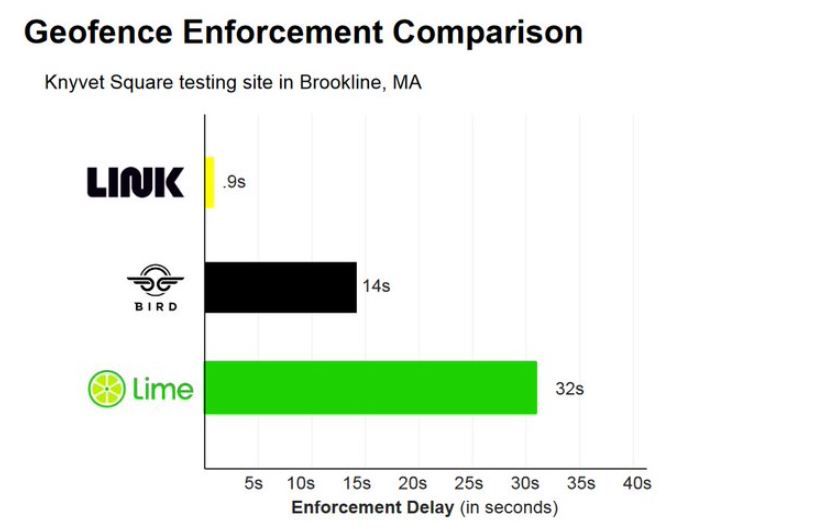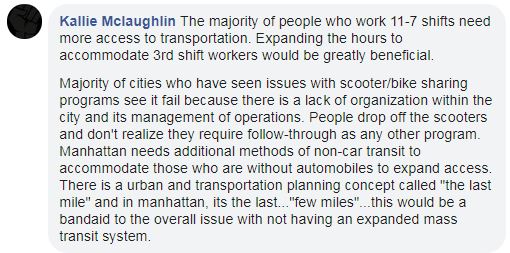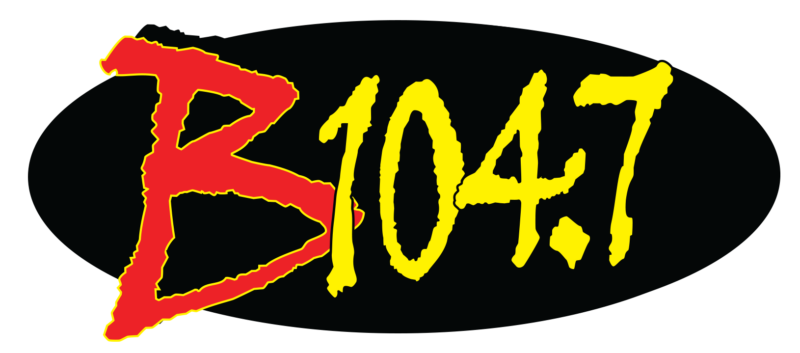Manhattan will see e-scooters on its right-of-ways starting in the Fall.
The City Commission Tuesday unanimously voted to finalize a deal authorizing a 500 rental e-scooter pilot program with micromobility networking company LINK YOUR CITY, Inc. — or just LINK. Collaborating with Kansas State University officials and students, who are simultaneously working on their own contract, half of the fleet will be deployed on campus. Launch is planned between August 1 and September 1, 2020.
Talks began in 2019 after Manhattan extended bicycle regulations to the devices. The move was prompted by the State of Kansas, which the same year passed legislation regulating e-scooters much like bicycles. Manhattan’s regulations ban e-scooter use on sidewalks Downtown and in Aggieville as well as in city parking facilities, limit speed at 15 miles per hour, and require parking in city-approved racks or curb-side on the street outside of C3 and C4 zoning districts.
In March, city commissioners unanimously authorized administration to begin negotiating a contract with micromobility management company Zagster over Lime and Bird. Manhattan will collect 25 cents per e-scooter rental off-campus, while KSU will collect that for on-campus rentals. The only cost to the city associated with the program is staff time working on the contract and launch.
The city defines micromobility devices as electric-assisted bikes and scooters as well as motorized and self-balancing skateboards and even bicycles deployed by “micromobility network companies” — though not motorized wheelchairs and other “electric personal assistive mobility devices.”
Under the original plan, Zagster — which previously operated 250 micromobility programs including Wichita’s bike share and e-scooter rental programs — was to manage the program utilizing devices and apps created by LINK. But, the industry newcomer LINK has since merged with Zagster as Zagster appears to have went under following the pandemic — bringing everything under the LINK name.
“It’s still going to be LINK scooters, it’s still going to be the LINK mobile app,” says Assistant to the City Manager Jared Wasinger. “It is going to still include Zagster’s model of hiring W2 employees locally to manage the fleet and operations.”
Mayor Pro Tem Wynn Butler calls the program “excellent.”
“About as good as we’re going to get,” says Butler. “And the management of it, the maintenance of it, the geofencing, the control of it is all still as we talked about it originally — it’s just a name change.”
LINK, a subsidiary of Superpedestrian — founded at MIT near the end of 2019, is currently not widespread. The company has been trialing its service in Fort Pierce, Florida and the LINK app on Google Play notes just 1,000 plus downloads and 18 total reviews. That’s compared to Lime’s reported 10 million plus downloads and 103,000 reviews and Bird’s 5 million plus downloads and 35,000 reviews.
Via a mobile app, riders will pay $1 to unlock the device and an additional 15 cents per minute thereafter. The e-scooters will be in operation from 7 a.m. to 10 p.m., at which point they will stop taking rentals. LINK employees will collect e-scooters in the evening for charging and maintenance in addition to re-balancing e-scooter distribution around town during the daytime hours.
LINK boasts shorter stopping distances than competitors and an active vehicle intelligence system that continuously scans for errors and malfunctions.
Using GPS technology in the device, geofencing can restrict riding, reduce speed maximums, and prohibit ending a rental in certain areas of the city and campus. The restrictions can also be amended for special events. In past meetings, city and university officials have pointed to that on-board GPS tech and responsiveness to geofence restrictions as a deciding factor over better-known companies.

Courtesy of the City of Manhattan
Residents with knowledge of the industry have questioned these claims in the past, though.
LINK will work with city and KSU officials going forward to determine where to place the e-scooters around town and campus as well as where to reduce speed maximums and prohibit parking. Commissioner Linda Morse asked for an update when those decisions are reached. LINK employees will also be tasked with removing improperly parked e-scooters or face up to $50 fines per device.
LINK will also work locally with Green Apple Bikes, helping manage and re-balance bicycle distribution around town as well. GAB will assist with marketing the new service as well as with rider safety education and community engagement efforts.
KMAN posted polls on Twitter and Manhattan-based community Facebook groups asking for the public’s perception on whether e-scooters were a positive or negative for the local community. Responses skewed positive out of more than 500 total replies, though Facebook polls permit users to submit votes for more than one answer. As a result, the data is not entirely scientific and cannot be generalized further.


note: Facebook polls permit users to submit their own replies and vote for more than one answer. KMAN only created positive and negative responses.
Online comments to e-scooters highlighted concerns about safety on roadways and for pedestrians. Others saw more trouble than good in the program based on the examples seen in other cities.

One respondent, though, says much of the chaos surrounding e-scooters was the result of poorly planned launches. Another says they don’t expect to see that behavior in Manhattan.

One resident, though, took issue with the hours of operation for the e-scooters.

BikeWalkMHK Organizer Brandon Kliewer also responded to KMAN via email, saying the topic of Manhattan’s infrastructure is often left out of conversations surrounding expanding micromobility offerings.
“Manhattan, KS has made progress over the past two decades but is still behind on equitable and accessible active transportation infrastructure,” says Kliewer. “The City of Manhattan’s active transportation infrastructure has not kept pace with our peer and aspirational college towns of similar size.”
KMAN has reached out for further comment from Kliewer.
The post Manhattan, KSU to split deployment of 500 e-scooters in pilot program appeared first on News Radio KMAN.

